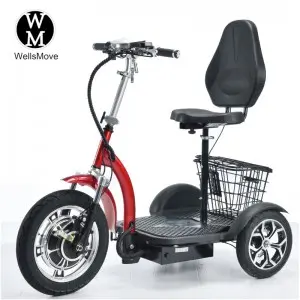Scooters have become an important mode of transportation for people with mobility impairments. These devices provide independence and freedom of movement, allowing users to participate in a variety of activities and maintain a sense of autonomy. However, just like operating any other motor vehicle, it is important to consider the potential risks and liabilities associated with using a mobility scooter, particularly those associated with consuming alcohol.
Whether it is safe to drink alcohol and drive a mobility scooter is a matter of concern. Drinking alcohol can impair cognitive and motor function, affecting a person’s ability to safely operate any type of vehicle. The potential risks associated with drinking alcohol are no different when it comes to e-scooters. In this article, we’ll look at the effects of drinking alcohol and using a mobility scooter, as well as the legal and safety considerations individuals should be aware of.
First, it is important to understand that operating a mobility scooter while under the influence of alcohol can pose serious risks to the user and others. Alcohol impairs judgment, coordination, and reaction time, all of which are critical to operating a mobility scooter safely. While electric scooters may not be able to reach high speeds, they still require a clear and focused mind to operate effectively, especially in crowded or busy environments.
From a legal perspective, rules regarding alcohol and mobility scooters may vary by location. In many jurisdictions, driving a mobility scooter while intoxicated will be subject to the same laws and penalties as driving under the influence of alcohol or drugs (DUI). This means that if caught driving an e-scooter while intoxicated, individuals may face legal consequences, including fines, driver’s license suspension, and even jail time.
In addition, the possibility of accidents and injuries caused by drunk driving of a mobility scooter cannot be ignored. Just like driving a car or motorcycle, the risk of crashes, falls, and other accidents increases significantly when drinking alcohol. Not only does this endanger the safety of the individual using the mobility scooter, but it also poses a threat to pedestrians and other individuals sharing the same space.
In addition to legal and safety issues, the ethical and moral implications of drinking alcohol and using mobility scooters must also be considered. Individuals have a responsibility to prioritize their own safety and the safety of others, which includes making informed decisions about alcohol consumption and vehicle operation. Engaging in risky behavior through drinking alcohol and using mobility scooters not only puts personal safety at risk but also undermines trust and respect within the community.
Given these factors, drinking alcohol and driving a mobility scooter is clearly not a safe or responsible choice. Individuals who rely on mobility scooters should be aware of the potential consequences of drinking alcohol and should prioritize their own safety and the safety of others and avoid operating a mobility scooter while intoxicated.
Instead, individuals should explore other transportation options if planning to consume alcohol. This may involve having a designated driver, using public transport, or relying on the help of friends or family to ensure safe and sober transportation. By making responsible choices and prioritizing safety, individuals can continue to enjoy the benefits of mobility scooters while minimizing the risks associated with drinking.
In summary, whether it is safe to drink and drive a mobility scooter is a critical issue that requires careful consideration. Alcohol impairs cognitive and motor function, posing significant risks to the safe operation of any vehicle, including e-scooters. Legal, safety and ethical issues all highlight the importance of avoiding alcohol when using a mobility scooter. By making responsible choices and prioritizing safety, individuals can continue to enjoy the freedom and independence that a mobility scooter provides while minimizing the potential for accidents and injuries.
Post time: Jul-01-2024



